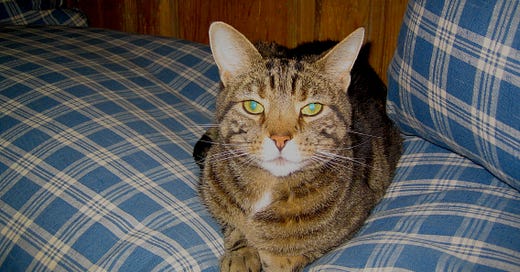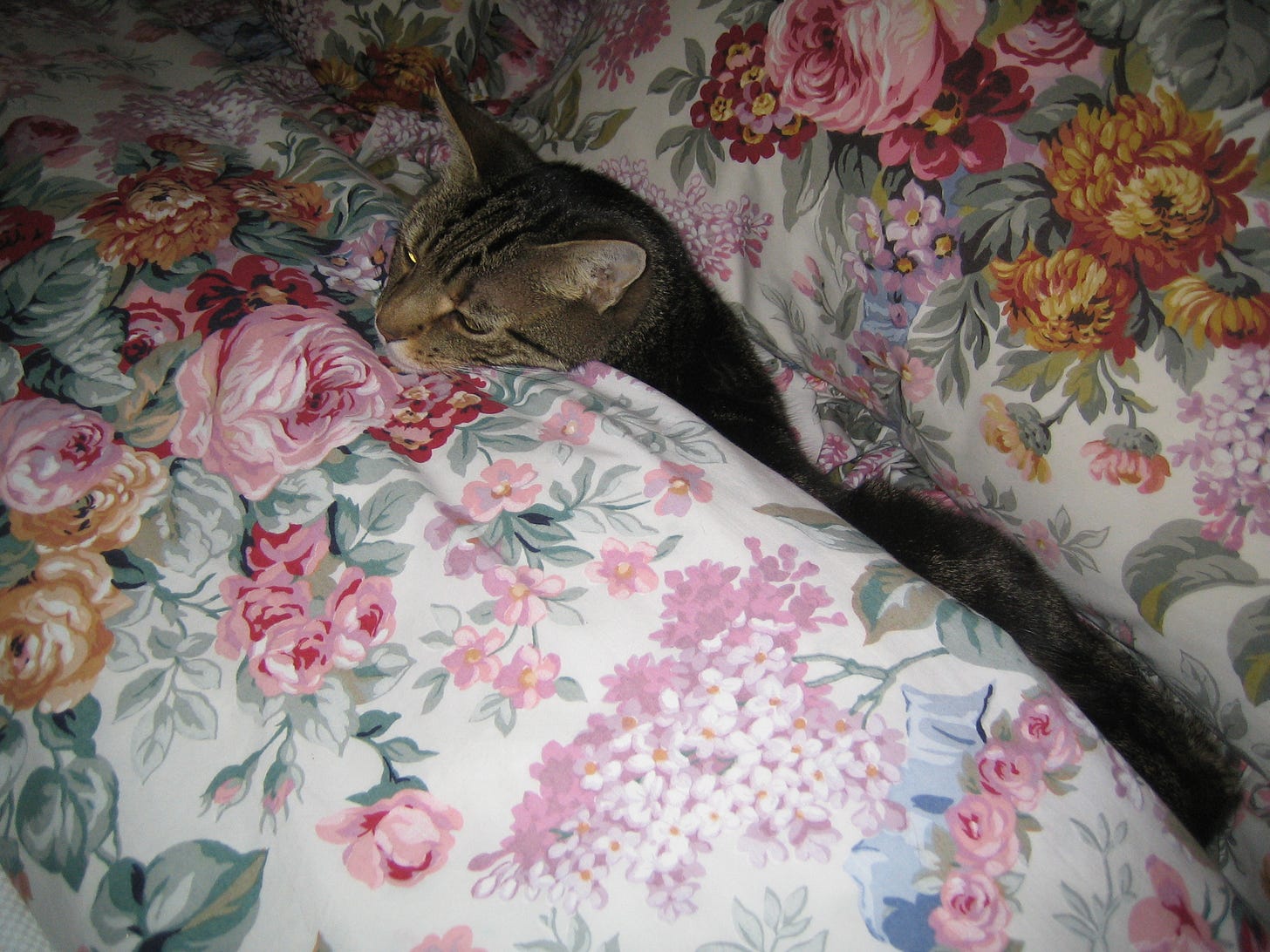Of Mice and Men
And roaches and other beasts. Humans are supposed to be the top of the food chain.
If you have ever lived inside four walls, you have dealt with unwelcome critters. I hope that you have only ever known them as occasional nuisances. I hope that you have never experienced that moment when the balance of power tips and you’re in the middle of what you realize, shuddering, is an infestation.
In 1995, I was getting my master’s degree at NYU and had just moved into my first big girl apartment in New York City. It was a mostly functional studio on the Upper East Side around the corner from H&H Bagels East. The south-facing courtyard windows meant that every morning I was bathed in the golden aroma of my future breakfast. It had a fluorescent-lit corner kitchen where a Haitian fashion designer once cooked me poulet créole before he drank too much and passed out, and a bathroom with unstable enough water pressure that once a week I’d yell “FUCK” very loudly and jump aside to avoid a scalding. I had only ever lived in New York sublets before so I didn’t know that you can call the landlord and withhold rent over shit like that.
Though I was born in New York City, back then I was relatively new to it as an adult, so the fact that I shared that apartment with a proliferating family of cockroaches didn’t phase me. I had been primed for squalor on an earlier young adult visit, when I went into a Garment District deli to ask to use the toilet—recall that in Los Angeles, delis are restaurants—and in that grimy back bodega bathroom, I lifted up the toilet seat to discover a rat frozen in rigor mortis seemingly shooting itself out of the bowl. In comparison, a few slender, pale brown roaches were light work. Enough of them eluded my variously placed traps that I resigned myself to live with them.
Then that summer my friend Melody, one of my closest homegirls since high school, stopped over. She was coming from San Franciso, where she was taking a break from a disappointing romance, and on her way to France, where she hoped to mend a tortured relationship with her very underperforming dad. It was a big agenda.
We spent the day running around checking out the freaks in dense, sticky summer heat. That night, back at my apartment, Melody braved the angry shower, and then, still dewy, changed into a pristine white nightgown. A tropical rainstorm cracked open, and we opened the window next to my bed and hopped on to watch the rain. As we debriefed our day, Melody leaned against the wall, and a cockroach that had crawled up above her head dropped down and fell into her cleavage.
I was out of that place a year later when my sister, who had already been living in New York for a few years, handed me her one bedroom on 14th Street between Avenues A and B. It’s practically Beverly Hills now, but back then, it was still fetid. The apartment had plywood floors and a big cast iron bathtub wedged in between the kitchen window and a rickety gas range you needed to light with matches.
Sitting in that bath, I would gaze down through the cloudy glass window and its padlocked security grate to the vacant lot on East 13th Street below. It was strewn with rusted out appliances, barbed wire and broken glass, and inhabited by a family of squatters. By day, the teenage son would noodle excruciating electric guitar on his portable amp, while his younger brother, a toddler, would run around clad in nothing but diapers and a crash helmet. Even on Planet Tetanus, it’s safety first.
When the first mouse showed up, I screamed. When the second one followed soon after, I called my sister.
“I guess I’ll take the cat,” I said through gritted teeth. “How soon can you get him over here?”
The cat in question was Manuel, a nine-month-old teenager my sister adopted as a baby to fold in with Burt, a street cat of indeterminate age, who had come to live with her a few years before. Burt was black, had six toes and the haunted air of an aging cowboy. Manuel and he just weren’t getting along and my sister was running out of options. I grew up with dogs but never really related to cats, and I had never had a pet of my very own. Suddenly necessity made that decision for me.
Three hours later, my sister’s rocker boyfriend showed up in a slim cut tailored shirt with a cardboard carrier under his arm. We opened it up to reveal a shaking, mewling nine-month-old tabby in fear for his life. I had met Manuel before. I was the one who named him. But it was only now that he needed me and I needed him and we fell madly in love.
By then my brother had moved to the city as well and was rooming with my sister in a two-bedroom apartment on the not-yet-chic Polish side of Greenpoint. It was covered in synthetic siding, had paper-thin walls and gaps in the floorboards wide enough to fit a pencil—a primrose path for a beast as supple as a mouse. Soon there was a tribe, seemingly levitating through the cracks from an unseen nest below. Even with Burt’s level best, once the uninvited guests reached critical mass, they lost all fear. They’d saunter out leisurely, completely unbothered while my siblings ate dinner. One time my sister found one drowned in her bacon grease trap. It was head down and suffocated in the silky fat. You could find worse ways to go.
Manuel followed me to three other apartments in New York, then to Boulder when my father was dying, and eventually to Paris, where I was squatting in divine luxury conditions, in a mostly vacant three-bedroom apartment. It was around the corner from the Café de Flore and belonged to Nandish, a friend who worked in fashion PR. Nandish swanned around in Yohji Yamamoto and dated beautiful women. His family, half of which came from Nepali royalty, was loaded, but he could roll with anyone. He had excellent manners, read great books avidly, adored talking politics with me, and had a filthy, cheeky sense of humor. He loved that I was unshockable and when it was just the two of us in the place, we’d trade our most scandalous confidences late into the night, giggling.
Nandish hated Paris and avoided it whenever possible, returning only for work. So he’d lend out his place to starving writer friends such as yours truly. My only job was to keep the cleaning lady paid, reboot the excruciating internet, and make sure I was around to let in his glamourous straggler friends, for a monthly rent of €0. Many of them I am still friends with today.
You wonder why I decided so easily to move to Paris? I send prayers up to Nandish all the time for how he enabled me to coast so blithely into that choice. With my mother’s help on a down payment loan, operating from Nandish’s home base, in the summer of 2006, I bought a one-bedroom in Montmartre. Now it was just a matter of going back to New York to rescue Manuel from half a year of housesitters.
I had utterly worn out my welcome at Nandish’s by then—I was supposed to stay for two months and stretched it out to eight, going on ten. When I returned that August to wait out getting the keys to my new place, Manuel was received like a tiger god. It seems that during my summertime absence, the occasional mouse had grown into a swinger’s colony that had quickly gotten to bacon grease levels of comfort.
“Manuel will handle it,” I promised Nandish, trying to sell him on the temporary cat roommate he never bargained for. And so he did. We celebrated every gruesome kill until finally, Manuel and I left Nandish and his new girlfriend, now wife, in peace.
Finding the concentration to write these verminous memories is taxing right now, because of the loud buzzing in my office. It is glorious springtime in Saint-Maxime, and unseasonably hot, and so a wayward colony of honeybees has decided to visit, perhaps to stay. I am not Nandish.
We have had years when the maximiens noticed a lot of wasps at backyard barbecues. We have had years so wet and damp that mold and moss overtook the sidewalks and edged the whole village in acid green. This spring’s bees, though, are going from curious happenstance to Biblical plague.
First they came to Angélique’s place across the street from me, a week or so ago. Since so much communication with Angélique includes Eeyore-like guilt trips about how we never see each other, I admit that I don’t always pick up when it’s her calling. She left a voicemail wanting to know if I had bees at my house. Not that I noticed, I wrote back.
A few hours later we ran into each other out in the street, and she gestured up to her roof where a tornado of honeybees encircled her rain gutters and terra cotta shingles. They weren’t quite a swarm, but they were numerous enough to upset the force. That many bees together are operating in a strange psychic groupmind. I know fuck all about bees, but I know that they’re listening to some other inner voice when they act socially like that. Imagine that you’re walking down the street and, rather than the odd flaneur, you run into a bunch of Paris Saint-Germain fans looking for a reason. This felt like that. It signaled threat.
“I must have a colony that’s moved into the attic,” Angélique said, chagrined. Well she better deal with it, I thought, rolling my eyes.
Lazing around my backyard a few hours later, she called to tell me that she spoke to a nearby beekeeper, who told her that empty boxes at his place just down the road were filling up with visitors. Perhaps there was a colony looking for a new home and these were the scouts.
“He told me they don’t sting,” she said.
Just then I looked up towards my house and noticed a bunch of hooligans buzzing around the end of the beam that holds up my living room ceiling, visible through the stone and mortar wall. Were these imported from Angélique’s? God damn it. I put my clogs on and stomped into my living room. The loud buzzing got to me before I saw the hundred-odd bees slamming themselves against my living room windows. They had to be coming in through beam. Because I didn’t want the cats to escape, I could open just one window at a time and try to sweep them outside, to where they clearly wanted to be more than my living room.

I like bees. I don’t fear them. I want them to live. They’re important and they’re under threat. But every time one finally flew its way to freedom, another two would come over to the window and repeat the same confused Pina Bausch routine.
Twenty minutes went by like this, me opening and slamming window by window, up and down my living room, until I noticed that the ones who remained were starting to slow down. They seemed groggy and tired until, one by one, they started dropping out of the air and dying. By this point, as much as I was still rooting for them in theory, they had become a legitimate nuisance, and I was getting less regretful as I accidentally stepped on one and then another getting the room back under control. By dusk, the buzzing had stopped.
Cassandre wrote, filled with exclamation points, to tell me she too had been bombarded. (Bombeeded? Couldn’t resist.) And then just like that, the following day, peace returned. We all figured the bees had moved on to another village in another valley, like the noisiest, least welcome wandering minstrels.
All was fine until Friday afternoon, stepping into my living room with my friend Tom, whom I had just collected from the train station. Once again the noise preceded the sight, except it was fifty times louder, with easily ten times the quantity of bees as the previous week. We panicked. Tom started opening the windows as I raced upstairs to make sure the cats were enclosed in my office. When I walked in, the bee scene up there was denser still than down below. It was miniature Verdun. Bees were panic dive bombing, and piles of them were dead on the floor. Eleanor and Lucy, who love nothing more than to chase the odd housefly, were huddled under the daybed, their eyes wide in shock.
I threw open the windows and chased as many out as I could while Tom did the same downstairs. For hours, the high pitched noise from the odd lingering stray made sitting in the living room having a drink impossible, so we beat it to the kitchen until the buzzing slowed down into sleep, and then death.
Yesterday morning I left an incoherent message for the local beekeeper to see if he had any ideas. He has not called back, though something tells me he is busy. When I called Béatrice, a nouveau beekeeper herself in the weekending hipster Parisian mold, she had no idea what might be going on either. There are no hives or swarms that I can see anywhere on my property.
I have written before about Saint-Maxime’s potential as a refuge for lost souls. I meant people, God damn it.








Really absorbing tales of New York characters & their vermin with even classier French country folk & their elevated, bees with suicidal tendencies.
I remember Manuel!